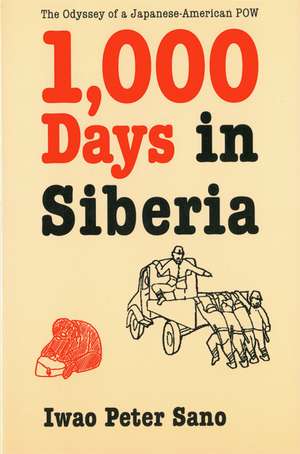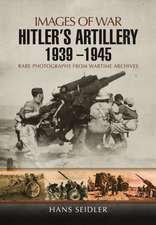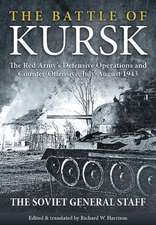One Thousand Days in Siberia: The Odyssey of a Japanese-American POW
Autor Iwao Peter Sanoen Limba Engleză Hardback – 31 aug 1997
Iwao Peter Sano, a California Nisei, sailed to Japan in 1939 to become an adopted son to his childless aunt and uncle. He was fifteen and knew no Japanese. In the spring of 1945, loyal to his new country, Sano was drafted in the last levy raised in the war. Sent through Korea to join the Kwantung Army in Manchuria, Sano arrived in Hailar, one hundred miles from the Soviet border, as the war was coming to a close. In the confusion that resulted when the war ended, Sano had the bad luck to be in a unit that surrendered to the Russians. It would be nearly three years before he was released to return to Japan.
Sano's account of life in the POW and labor camps of Siberia is the story of a little-known part of the great conflagration that was World War II. It is also the poignant memoir of a man who was always an outsider, both as an American youth of Japanese ancestry and then as a young Japanese man whose loyalties were suspect to his new compatriots.
Preț: 258.76 lei
Nou
Puncte Express: 388
Preț estimativ în valută:
49.52€ • 51.63$ • 41.16£
49.52€ • 51.63$ • 41.16£
Carte indisponibilă temporar
Doresc să fiu notificat când acest titlu va fi disponibil:
Se trimite...
Preluare comenzi: 021 569.72.76
Specificații
ISBN-13: 9780803242623
ISBN-10: 080324262X
Pagini: 214
Ilustrații: Illus., map
Dimensiuni: 140 x 216 x 15 mm
Greutate: 0.43 kg
Editura: Nebraska
Colecția University of Nebraska Press
Locul publicării:United States
ISBN-10: 080324262X
Pagini: 214
Ilustrații: Illus., map
Dimensiuni: 140 x 216 x 15 mm
Greutate: 0.43 kg
Editura: Nebraska
Colecția University of Nebraska Press
Locul publicării:United States
Notă biografică
Iwao Peter Sano was returned to Japan in 1948 and worked for the U.S. occupation forces before coming back to the United States in 1952. He is now a retired architect living in Palo Alto.
Recenzii
"How does a one-time American farm boy become a Japanese Imperial Army prisoner of war in the Soviet Union after World War II? Iwao Peter Sano’s tale of how this happened to him is remarkable enough. But equally remarkable is that he can speak of starving, nearly dying and catching malaria in Siberian POW camps with a voice that is quietly humorous and genteel."—Japan Quarterly
"Born in Brawley, California, Sano went to Japan in 1939 to become the adopted son (yoshi) of his childless aunt and uncle. In March, 1945, he was drafted into the Japanese army and sent to join the Kwantung Army in Manchuria. Five months later, when Japanese forces had surrendered to the Soviet army, Sano became a prisoner of war. For nearly three years he labored in a Soviet munitions factory, on a collective farm, and in a Siberian coal mine. . . . [This] is a unique and fascinating account of mixed and divided loyalties, dismay and confusion, sacrifice and salvation—clearly told with an understated mixture of fatalism and hope. . . . A vivid, revealing memoir."—Japanese-American Veterans Newsletter




